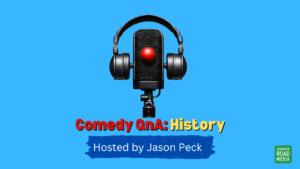As you probably know by now I think it’s important for humorous speakers to be able to handle joke stories or street jokes, if you prefer. Essentially jokes stories are ones that people tell you on the street. Or at work, down the pub, etc.
In the comedy world a lot of people see joke-smiths like the ones I’ve mentioned in previous posts about, as hacks. In the UK for instance there’s a general divide between what’s generally referred to as the “northern comics” (so-called because they perform in working men’s club, cabaret night’s etc) in the north of England. whereas, generally in the south a lot of comedians are described as being “alternative” comedians.
For instance: a lot of these comedians write their own material and their view of the world isn’t as interchangeable as those joke stories of the northern comic. They came as an alternative to the mainstream “my mother-in-law” comedy of the day (the 1970s).
What a lot of people fail to realise is that the “alternative” movement is in fact dead. It essentially died when Prime Minister Thatcher retired (1990), or got booted out of office, whichever came first. So long live the alternative! So what is it now? Post-Alternative? New Comedy? I honestly don’t know and I don’t think it really matters.
What I do know is this…
I have seen and heard very funny comics from both sides of the divide. Thanks to my father I grew up watching comedians like Frank Carson, Bobby Davro, Bernard Manning and Mike Reid. These guys tell joke stories, predominantly.
I also got exposed to the new wave of comedians like Ben Elton, Rik Mayall, Harry Enfield and so on. These guys did routines, stories and comedy bits and so on. But that doesn’t mean to say they were not structured in such a way to produce laughs, because produce laughs they did.
For me funny is funny.
I know I’ve potentially alienated some of my readers because of these comments, but I guess I just have to roll with the punches. Or punchlines… ahem.
I just know that by being able to create a comedy act that doesn’t solely rely on expletives and crude material to get laughs, I can automatically broaden my prospective markets and, therefore, increase my work potential.
I have absolutely no problem with markets such as corporate, cruise ship, comedy clubs, holiday resorts, etc. If I need to spice up my act then I can do so with well-placed swear-words without making the punchlines dependant on them.
That said, there is generally a stigma against using joke stories on the London comedy club circuit, and quite right too. However, it doesn’t really apply in the corporate world.
So I think that it’s really valuable to have an understanding of how to edit and use street jokes, which can potentially help your act, or humorous speech, without them being dependant on them.
What I absolutely don’t agree with, however, is watching a comedian who has written their own material and then just stealing their gags.
I have heard comedians doing word-for-word routines that I know have come from elsewhere either because I have seen them performed by the original person or own a DVD of the performance. That’s something I cannot condone. It’s even potentially a problem with funny presentations.
If you are delivering material delivered by another comic and passing it off as you’re own, you’re in deep trouble in my opinion. Morally, artistically, let alone legally…
On the other hand delivering an edited and well rehearsed street joke in the right circumstances can be a good safety device. The right circumstances, in my opinion, would be when working as a humorist in the corporate market, or perhaps in a rowdy comedy club. you can just hit them with a street joke and segue into the rest of your material from there.
Now you have a fair idea of why I have a love-hate relationship with joke stories. I guess it all depends on what day it is and my mood…
Note: There are affiliate links on this page. That means that if you purchase a product via my link I get paid a commission. It helps me pay the bills.




1 pings
[…] details a way in which you can format street jokes together to form a comedy monologue like old school comedians. Here’s the […]